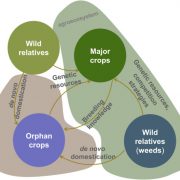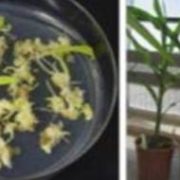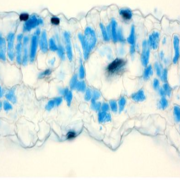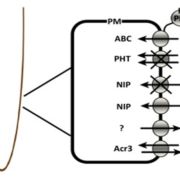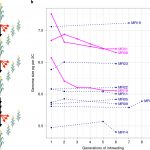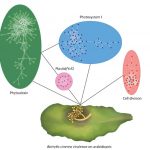Editorial and Special Issue. Biotechnology of the sweetpotato: Ensuring global food and nutrition security in the face of climate change (Plant Cell Reports)
 Global food security is increasingly threatened by expanding industrialization and skyrocketing human populations set in the backdrop of dramatically shifting environmental conditions due to climate change. Innovations in agricultural practices and technology are required to overcome the unprecedented challenges posed by these conditions. In this editorial, Kwak suggests that the sweetpotato plant (Ipomoea batatas) is an ideal candidate crop for overcoming food insecurity in the twenty-first century. The sweetpotato uses water efficiently, reduces soil erosion, provides highly-nutritious fodder for humans and animals in all of its parts, tolerates a wide range of temperatures, and requires only a four-month frost-free period for development. These intrinsic qualities make the sweetpotato especially suited to food production in a precariously shifting climate, however Kwak takes it a step further by calling for the development of a strategy to develop new cultivars of sweetpotato by introducing genes that allow them to tolerate greater temperature ranges, produce higher yields on marginal lands, and enhance metabolic pathways. These introduced traits will lend the sweetpotatoes of the future even greater global agricultural importance and have the potential to robustly address food insecurity. The editorial includes links to several articles in the forthcoming special issue on sweetpotato biotechnology. (Summary by Rebecca Hayes) Plant Cell Reports 10.1007/s00299-019-02468-0 Image from Wikipedia
Global food security is increasingly threatened by expanding industrialization and skyrocketing human populations set in the backdrop of dramatically shifting environmental conditions due to climate change. Innovations in agricultural practices and technology are required to overcome the unprecedented challenges posed by these conditions. In this editorial, Kwak suggests that the sweetpotato plant (Ipomoea batatas) is an ideal candidate crop for overcoming food insecurity in the twenty-first century. The sweetpotato uses water efficiently, reduces soil erosion, provides highly-nutritious fodder for humans and animals in all of its parts, tolerates a wide range of temperatures, and requires only a four-month frost-free period for development. These intrinsic qualities make the sweetpotato especially suited to food production in a precariously shifting climate, however Kwak takes it a step further by calling for the development of a strategy to develop new cultivars of sweetpotato by introducing genes that allow them to tolerate greater temperature ranges, produce higher yields on marginal lands, and enhance metabolic pathways. These introduced traits will lend the sweetpotatoes of the future even greater global agricultural importance and have the potential to robustly address food insecurity. The editorial includes links to several articles in the forthcoming special issue on sweetpotato biotechnology. (Summary by Rebecca Hayes) Plant Cell Reports 10.1007/s00299-019-02468-0 Image from Wikipedia


